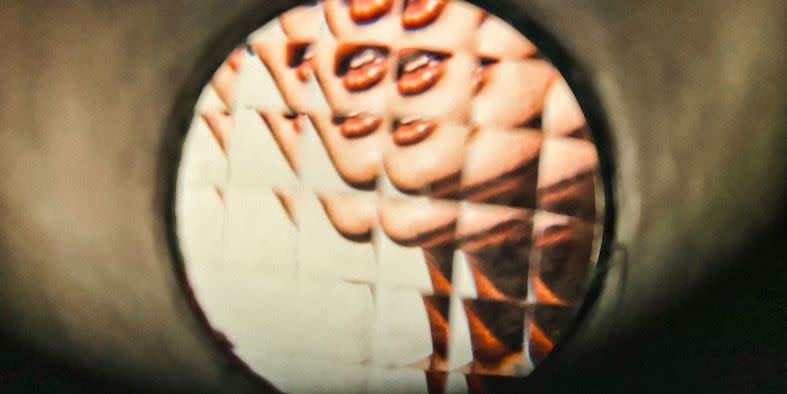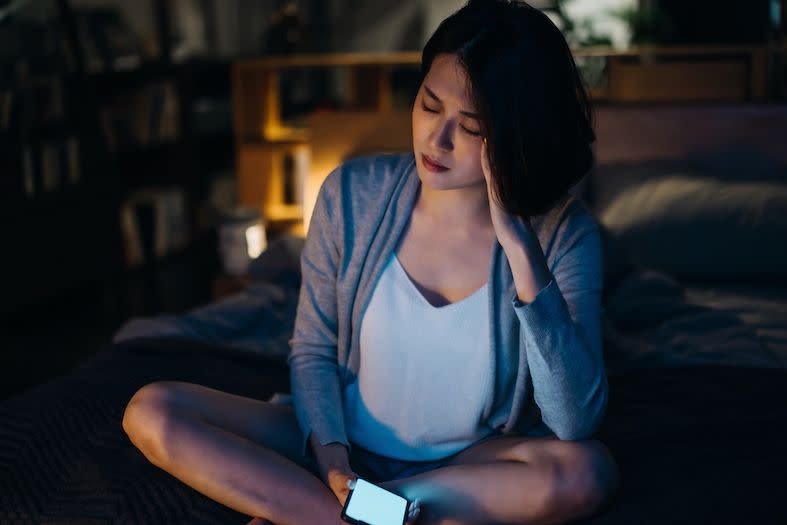The new law on deepfakes has officially kicked in: here's all you need to know

The word 'deepfake' is one that's increasingly seeping into the public consciousness, after incredible campaign work from the likes of organisations such as My Image My Choice and Not Your Porn, academics, charities, activists like Jess Davies in her BBC documentary, Deepfake Porn: Could You Be Next?, and Georgia Harrison, along with publications, such as us here at Cosmopolitan UK – where we regularly highlight how technology is being used to disproportionately target women.
If you're not familiar, deepfakes are a form of synthetically generated media (in layman's terms, it's when a photo or video of someone is misappropriated and edited into an imagined scenario; you can also deepfake audio so it sounds like someone is saying something they aren't).
Right now, we're seeing that as deepfake AI tech becomes more accessible and easy to use, with creators offering to take requests in dodgy chatrooms and nudifying apps being simple to download, sadly, there's been a staggering rise in the amount of non-consensual 'deepfake porn' being generated – a form of digital sexual assault.
Research conducted in 2018 by fraud detection company Sensity AI unearthed that shockingly over 90% of all deepfakes online are non-consensual pornographic clips targeting women, a figure which doesn't appear to have reversed.
This comes in tandem with other forms of image-based sexual abuse (commonly referred to as 'revenge porn') increasing; women's charity, Refuge, recently reported that the number of survivors supported by their tech team rose by 258% between 2018 and 2022.
Now, the government's newly amended Online Safety Bill has confirmed plans to put laws in place to protect us from the likes of being filmed without consent, 'downblousing' (think upskirting, but focussed above the waist) and more 'traditional' forms of image-based sexual abuse (wherein genuine, not falsified images or videos, are shared without consent - with equal potential to cause huge repercussions).
Here's all you need to know about the new proposed laws – and whether or not they go far enough...
What does the Online Safety Bill say about deepfakes?
Today the government have confirmed that the Online Safety Bill will recognise deepfake porn as being legitimately harmful and wrong, and will criminalise the sending, or sharing, of deepfake porn (sidenote: at this stage however, the bill hasn't passed through to royal ascent so until that happens, the law hasn't officially changed).
Prior to the new plans, laws around image-based abuse of any kind fell victim to a huge loophole: you had to prove the person who shared those images did so with intent to cause distress or humiliation (so saying "It was just a laugh!" was an easy - literal - get out of jail free card). Now, simply committing the act, irrespective of reason, can be punished by time in prison.
If a survivor can prove that deepfake images were shared with the hopes of causing alarm, humiliation or for the perp to obtain sexual gratification, the maximum sentence is two years of imprisonment (although this is just guidance and every judge can create their own sentencing). If these intentions cannot be proven, a perpetrator could still receive a custodial sentence of up to six months for sharing deepfake porn.
It is the first time deepfaking has been clearly defined in a bill, which is a really positive step.
Speaking about the changes to the law, the lord chancellor, Alex Chalk KC, said: "We are cracking down on abusers who share or manipulate intimate photos in order to hound or humiliate women and girls. Our changes will give police and prosecutors the powers they need to bring these cowards to justice, safeguarding women and girls from such vile abuse."
However, not everything is perfect with this new law change – the making and creating of deepfake porn in the first place unfortunately that does not fall under this new legislation, so this is the next hurdle urgently needing to be tackled.

Still, these changes are welcomed by those of us who've been saying that for years, the legal system in this country is massively lagging behind the actual world we live in, where we spend a lot of our time online. They're also part of the government's pledge to make vast improvements when it comes to the lives of women and girls as a whole, and our safety.
So, while this news - that the government is officially and publicly declaring that deepfake porn is a real issue and that it wants to try and tackle it - is music to our ears, it's also important to ask: what does this new Online Safety Bill mean for us in real terms? How easy will it be to actually put it in action?
In order to find out more, Cosmopolitan UK spoke to Alan Collins, a legal expert who is partner in the sex abuse team at Hugh James Solicitors, who said it could still be "difficult to prosecute offenders, and [previously] the law has struggled to keep up with rapid social media innovation, which is also inherently difficult to police".
Meaning, whilst the message this pending law change sends out to society is positive, policing it in real terms will still be a challenge and it's not going to be a magic wand that will see harmful digital acts like this disappear overnight, or all perpetrators instantly caught – or reprimanded.
"The devil is always in the detail and I can see arguments being played out in court about what was consensual and what was not," Collins comments. "What would the case be if consensual deepfake images were accessed by a third party, for instance? Another question that needs addressing is the voluntary posting of intimate images [or images that are sexual in nature] on social media. It could be argued, and I'm not saying this is right, that the person must be consenting to their use for sexual gratification.
"The challenge for legislators is to ensure prohibition of harmful behaviour does not over reach, so that it is not driven underground, making social media much harder than it already is to police."
Still, it's always worth reporting a crime like this (if that's what you feel is the right choice for you). The Revenge Porn Helpline is also a fantastic support resource, that can offer both practical advice and emotional care, for anyone who has been a victim of any type of any image-based abuse, whether the images are real or not.
Speaking last year, when the law changes were initially proposed, survivor and campaigner Kate Isaacs from Not Your Porn, said in an Instagram post: "The proposals, especially the Government's focus on the lack of consent as the base for culpability are a step in the right direction however intention is not action [and] these laws need to be made with the mindset of getting it right first time."
Isaacs added that the laws must take on board the experience shared by relevant organisations, academics in the image-based sexual abuse sphere, campaigners and survivors. "We need a multi stakeholder commitment from government and other key state functions to tackling online violence at a systemic level [...] We are optimistic, but not naive. Intent is not ACTION, which we desperately need."
What to do if you're a victim of deepfake porn
Reach out to the Revenge Porn Helpline (call 0345 6000 459 or email help@revengepornhelpline.org.uk), they can offer you emotional support and advise on what the next best steps are.
Contact Stop Non-Consensual Intimate Image Abuse, who will be able to help you create a case for having the images removed from the internet. They have a 90% success rate of having revenge porn images taken down.
Take screenshots as evidence and if you feel comfortable doing so, report what has happened to the police. If the perpetrator is known, there may already be grounds for the authorities to get in touch with them - even without the new laws having yet kicked into effect.
Follow Jennifer on Instagram and Twitter
To learn more about deepfakes and how they're impacting society, watch 'Deepfake Porn: Could You Be Next?' on BBC iPlayer
You Might Also Like


